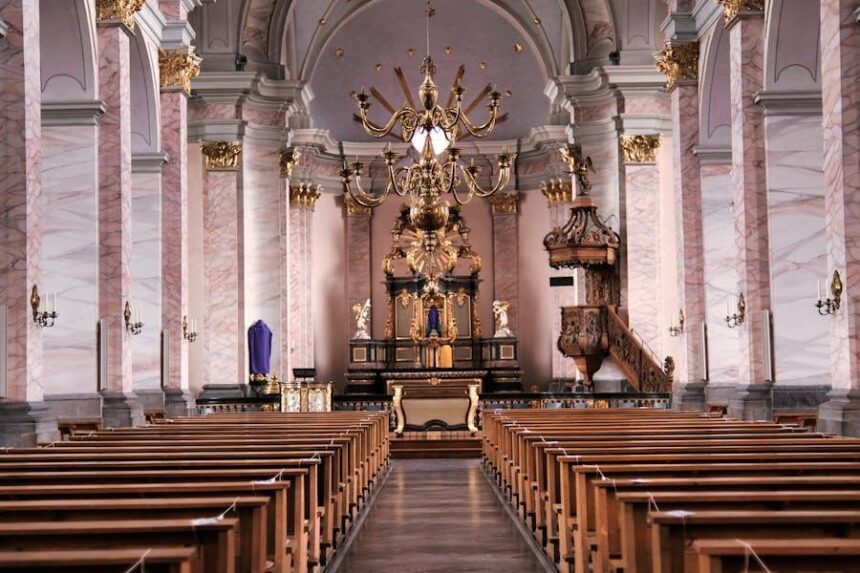The religious affiliations of the British royal family have long been a subject of public curiosity and speculation. Given the historical tensions between Protestantism and Catholicism in the United Kingdom, understanding the royal family’s religious stance is a matter of personal interest and historical significance. The question, “Is the royal family Catholic?” has persisted over centuries, rooted in the complex religious history of Britain. This article delves into the historical background, current beliefs, and public perceptions surrounding the religious affiliations of the British royal family. By examining these aspects, we aim to answer this intriguing question comprehensively.
Is the Royal Family Catholic?
The British royal family, contrary to popular belief, is not Catholic. They are predominantly members of the Church of England, a Protestant Anglican church established in the 16th century. This religious affiliation was formalized and solidified by a pivotal event in British history- the Act of Settlement 1701. This act, enacted during the reign of William III and Mary II, prohibited any Catholic from ascending to the British throne or marrying a Catholic. As a result, the royal family’s religious affiliation has remained distinctly Protestant, specifically Anglican.
Historical Context And Religious Background
Understanding whether the royal family is Catholic requires a look into the historical context of religion in Britain. The Reformation in the 16th century marked a significant shift when King Henry VIII broke away from the Roman Catholic Church and established the Church of England. This move was driven by both personal and political motives, primarily his desire to annul his marriage to Catherine of Aragon. The establishment of the Church of England was solidified by subsequent rulers, especially under Queen Elizabeth I, who firmly entrenched Protestantism in the country.
The Act of Settlement 1701 is a critical legislation that further ensured the British throne’s alignment with Protestantism. It explicitly barred Catholics and those married to Catholics from ascending the throne. This act aimed to secure a Protestant succession and prevent any return to Catholic rule, which had been marked by turmoil and conflict during the reign of Mary I, a devout Catholic.
Thus, the royal family’s religious affiliation has been intrinsically linked to the Church of England. Monarchs are not only members but also the Supreme Governors of the Church. This role underscores the deep-rooted connection between the monarchy and the Anglican Church, further distancing them from Catholicism.
The monarchy’s transition through the centuries has maintained this Protestant identity. Even in modern times, the royal family continues to uphold their Anglican faith, participating in religious ceremonies and services that reflect their commitment to the Church of England. This historical backdrop sets the stage for understanding the royal family’s current religious stance and addressing the question, “Is the royal family Catholic?”
The Act of Settlement And Its Impact
The Origin of the Act of Settlement: The Settlement Act of 1701 was enacted to ensure a Protestant succession to the British throne. This legislation was a direct response to the fears of a Catholic monarchy, which had been a source of conflict and instability in previous reigns.
Provisions of the Act:
The Act explicitly stated that no Catholic, nor anyone married to a Catholic, could ascend to the British throne. This provision was designed to secure a Protestant future for the monarchy and prevent any Catholic influence in the British government.
Historical Context:
The Act of Settlement’s historical context is rooted in the religious conflicts of the time. The Glorious Revolution of 1688 deposed the Catholic King James II in favor of the Protestant William III and Mary II. The Act of Settlement continued these efforts to ensure a stable Protestant monarchy.
Legal Implications:
The Act of Settlement has profound legal implications. It has shaped the succession of the British monarchy for over three centuries, influencing the religious affiliations of successive monarchs and their consorts.
Modern Relevance:
The Act of Settlement remains a crucial legislation governing the monarchy. Although there have been discussions about amending or repealing specific provisions, the Act plays a significant role in determining the religious stance of the royal family.
Misconceptions About The Royal Family’s Religion
- The notion that the royal family might be Catholic is a misconception often fueled by misunderstandings of history and religion. While there have been instances of interfaith marriages and conversions in European royal families, the British royal family has remained steadfastly Protestant.
- Some misconceptions arise from the fact that the British monarchy has historical ties with various European royal families, some of whom are Catholic. However, these ties have not influenced the religious stance of the British royal family. The Act of Settlement and other historical measures have ensured a Protestant lineage.
- Modern media and public speculation also contribute to these misconceptions. Sensational stories or misinterpretations of royal events can lead to confusion about the family’s religious beliefs. It is essential to rely on historical facts and official records to understand the royal family’s true religious affiliations.
The Role Of Religion In Modern Royal Duties
Religious Representation: The British royal family often represents the nation at significant domestic and international religious events. Their presence at such events underscores their role as religious figures and national symbols.
Charitable and Social Work: Many royal family members are patrons of religious charities and organizations. Their involvement in these causes highlights the importance of faith and religious values in their public and private lives.
Interfaith Engagement: While maintaining their Anglican faith, the royal family also engages in interfaith activities. This engagement promotes religious tolerance and understanding, reflecting modern British society’s multicultural and multi-faith nature.
Personal Faith and Public Duty: The personal faith of individual royal family members often intersects with their public duties. Their personal beliefs inform their approach to their roles and responsibilities, contributing to their public image and national significance.
Conclusion
The British royal family is firmly rooted in the Anglican faith, with a long history of Protestantism dating back to the Reformation. The Act of Settlement 1701 has been crucial in maintaining this religious affiliation. While misconceptions about their faith persist, historical facts and modern practices consistently demonstrate their commitment to the Church of England. Understanding this helps clarify the royal family’s religious stance and addresses the question, “Is the royal family Catholic?”
FAQ’s
Has any British monarch been Catholic?
Yes, Mary I was a Catholic monarch, but her reign was marked by religious conflict. Subsequent monarchs have been Protestant.
Do any members of the royal family practice Catholicism?
No current senior members of the British royal family practice Catholicism. They are all members of the Church of England.
What is the role of the monarch in the Church of England?
The British monarch is the Supreme Governor of the Church of England, a role that involves overseeing the church’s administration and maintaining its traditions.




